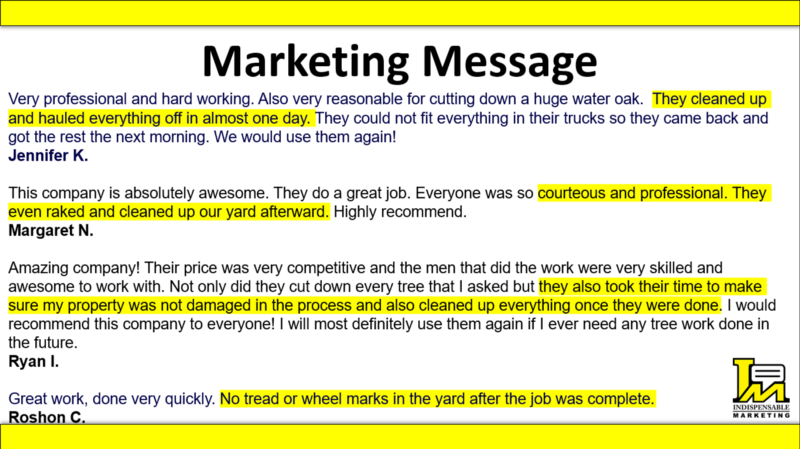How to Use Reviews, Testimonials and Unsolicited Feedback to Create Your Marketing Message Strategy
Online reviews, testimonials, unsolicited feedback or any 3rd party proof must be a important part of creating your marketing message strategy these days. The insight gain from any 3rd party proof provides you with a direction for creating a powerful marketing message strategy.
What’s often overlooked by small business owners in the gathering process of 3rd party proof is the actual words and phrases used by a client. In my experience a good review, testimonial, case study, blurb, or positive unsolicited feedback often implies that this is an ideal customer for your business. They had the right problem, you solved it with the right approach, and they had a great experience.
Here’s the point – if you want to attract more ideal clients like the ones giving you great feedback then you should pay very close attention to how they talk about your service – in particular, the words and phrases that show up repeatedly.
There’s money making and revenue generating insights in those words and phrases as your best customers are telling you what it is that you do that solves the real problem they have.
Home Service Contractor Marketing Message Example
Let’s say you own a tree service business. Your potential customers will automatically assume that you know how to take down trees. But that doesn’t really address the problem the potential customer has.
For most homeowners, their biggest problem associated with a home service contractor is about something beyond the basic service the business provides. Homeowners hate having to wait around for their service window. When they hire someone to handle their tree removal, the team leaves tread or wheel marks and stump grindings in the yard.

These are the real problems your clients have. So your marketing message is not, “We know how to remove trees” — of course you do! Instead, it’s “We never damage your yard and always clean up when we’re done.”
Professional Service Marketing Message Example
Let’s say you’re a managing partner of a law firm. Your potential clients will automatically assume that you know how to provide legal advice and navigate legal requirements. But that doesn’t really address the problem a potential client has.
For most clients, their biggest problem associated with an attorney is about something beyond the legal service they provide. Clients hate when attorneys do not return phone calls or emails in a timely manner. When attorneys make them feel bad about asking questions or not explaining things in layman’s terms. These are the real problems your clients have.
So your marketing message is not, “We know how to practice business law” or ” We have the knowledge and experience to help” – of course, you do! Instead, it’s “We return your calls, every time.” Or, “We welcome all questions and always make legal terminology easy to understand.”
For these two businesses and so many others that I’ve worked with over the years, reviews, testimonials, case studies, blurbs, or positive unsolicited feedback is a strategic marketing asset to help attract even more ideal clients as much as a vehicle for service verification.
The Process of 3rd Party Proof Research For Marketing Message Strategy
Turn to your case study interviews, past emails with positive unsolicited feedback, LinkedIn recommendations, and reviews on Google or any industry-specific review sites and start carefully reading. (Negative 3rd party feedback can give you a lot of insight as well, but for now, that’s not what we are looking for.)
As you read the 3rd party proof start noticing words, phrases, themes, and patterns that are repeated. This is your client explaining the real problems your firm solves for them, the things you do that others don’t, what they value most from purchasing your services, these are the words, phrases, and themes you need to guide your marketing message strategy right now.
Other Benefits of 3rd Party Proo f
Using positive feedback to develop a marketing message strategy – one that offers precisely what your ideal clients value is how you turn 3rd party proof into a powerful marketing message. But, you can also often find a handful of recurring themes that make great expert article topics, FAQs, emails subject lines, and ad copy for your educational presentations or Google Ads.
It’s all about using the words and phrases of your ideal clients to attract more of the same.
Contact your marketing consultant at Indispensable Marketing
If you’re a small service based business that needs help with developing a powerful marketing message and showing up on the first page of search results on Google, Bing or Yahoo at Indispensable Marketing we can help. We offer marketing strategy consulting, marketing audits, monthly marketing packages, consultations, exploratory calls or monthly local SEO services. Contact us for more information.




